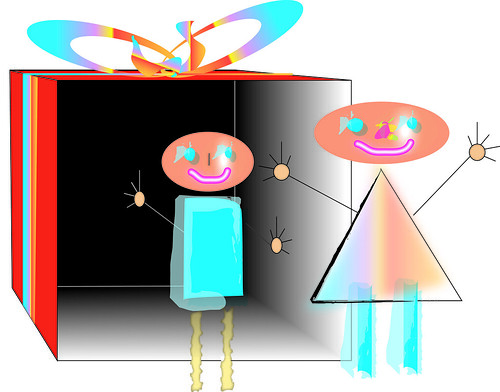In true Web fashion - I have once again stumbled on inspirational blog posts that have encouraged my thinking and inspired another post.
100 Conversations is an initiative set up by
Tony Karrer who maintains the
eLearning Technology blog. Tony "is CEO/CTO of TechEmpower, a software, web and eLearning development firm based in Los Angeles, and is considered one of the top technologists in e-Learning. " (quote from Tony's blogger profile).
Within Tony's list of
100 Conversations - I believe there is a conversation for you. I have set up a draft post behind the scenes of the 25 of the 100 conversations that I feel inspired to participate in. This should keep me busy through the holidays. Thanks Tony for the ideas - it helps to keep me motivated.
The first conversation that seems relevant to me at present is number 31 on Tony's list of 100 Conversations. I address this for two reasons. One - it is relevant to my learning at present. Two - I hope to encourage other educators and students who are starting out in the blogging world or are wondering about their illusive audience.
31. How do I envision (envisage) my audience.
This has been an interesting revelation to me in recent weeks. Soon after my post "
Generation C" on October 15th I began to feel very disillusioned about my image of my audience. Although I have a stat counter, I wasn't a very prolific observer of my stats nor did I really know how to explore my stats positively. As I belong to
EntreCard - I envisaged my small audience to be EntreCard droppers (and I mean droppers not readers). I received minimum comments - and thus imagined I had no serious readers.
After blogging fairly noncommittally with little aim - on
ICT in Early Learning - I was beginning to wonder what my motivations were for blogging and whether it was worth the space on the web. And then a light bulb moment encouraged by a conversation (a "verbal comment") I had with a member of the CORE Education team occurred. The CORE member had read my blog, enjoyed my blog and quoted my "
C Generation" blog post in a recent job interview for CORE - a job she recently accepted. I was blown away and I was incredibly humbled. I had an audience I never envisaged. And what I had to say or highlight, was being noticed.
After this I decided to look more closely at my stats. I had recently loaded
Feedjit widget to my site and when I explored this widget further - namely by clicking on the "
Watch in Real Time" option - I began to take notice of who was looking at my blog, where they had arrived from, and what they were searching for. The thing I notice most was that there is a huge audience out there looking for information about technology and learning for young children. By observing readers search queries I have begun to target my post to address some of the queries educators have about technology in education.
I have realised that with the experience of introducing blogging to young children at
Manaia Kindergarten, presenting with
Tania Coutts at various conferences, and addressing queries that flow through our phone lines - Tania and I have some professional learning to offer on the world wide web as elearners and educators. And maybe this is something we need to take seriously and to post professionally as we become immersed in this ever growing global conversation.
I have also read that only approx 4% of readers ever comment. Thus one has to decide when beginning a blog, what is the purpose of the blog, what do I hope to achieve by blogging, and what do I want to get out of it. I have decided that although I LOVE COMMENTS - I will no longer write for comments. Now that I have some idea about who my audience really is, the aim of this blog is to advocate for young children, for their learning and elearning, their protection, and for their right to be considered competent contributors to everyday and global conversations and learning. The other aim is to encourage others to join this advocacy role.
So how do I envisage my audience now? Prehaps just the one, though I know of two others. And the rest? Well that is quite scary. I was the youngest in my family and my sisters had a lot to say at dinner table conversations. It took me until I was 21 before I realised that sometimes people listened to my contributions too. So I do worry that my contributions are sometimes that of the youngest sister and maybe not so well informed. Forgive me if that is the case. If blogging was truly an anonymous platform I'd feel better. However I want to be part of the conversation, to contribute, to learn, and to advocate.
I believe ones vision of ones audience does matter. It helps to get to know your audience through your stats if not your comments, and then to target your posts and provide a relevant message for those who really are your audience. And more importantly I believe the internet provides a platform we are privileged to have at our finger tips and to join the conversations as an educator and learner, either as a reader or blogger, is a privilege we should grab with both hands.
PS: Thanks Janine for being part of my audience. I have noticed and I do appreciate.
Do you have something to say about education? Can you contribute? Check out
Technology for Teachers


